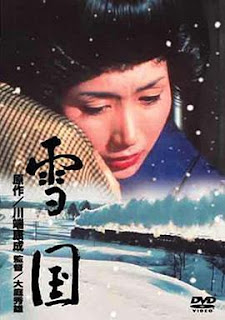72. Yoko tī kheh-chàn tàu-kha-chhiú
Án-ne liáu, yi koh bô-nāi khioh khí hiah-ê ké-thâu-chang.
"Boaih hō͘ pêng-iú tán bô lâng. Tún-lâi ê sî, góa bô koh lâi ah."
"Ū khòaⁿ-e lō͘ bô?"
"Ū khòaⁿ--ē."
M̄-koh, ta̍h tio̍h saⁿ-á-ki, soah kha tio̍h-tak.
Siūⁿ tio̍h tī chá-khí chhit-tiám hām àm-sî saⁿ-tiám, chi̍t-kang lāi-té, yi tī ī-siâng ê sî-kan chhōe phāng lâi nn̄g-kái, Shimamura kám-kak che sī put-tek-liáu ê tāi-chì.
Ná kòe-nî chng siông-á ki án-ne, kheh-chàn oân-kang tng-tih mûi-kháu chng âng-hio̍h ê png-á ki. Che sī ūi-tio̍h boeh hoan-gêng lâi khòaⁿ âng-hio̍h ê lâng-kheh.
Tī hia tōa-sè-siaⁿ chí-hui ê sī chi̍t-ê lîm-sî chhiàⁿ ê niá-pan, i keng-thé ka-tī kóng, sī chi̍t-chiah kòe-lō͘-chiáu. Chit-chióng lîm-sî-kang, ū-ê ùi chhun-thiⁿ chhiū-á puh-íⁿ kàu chhiu-thiⁿ hio̍h-á piàn âng tiong-kan, lâi lāi-soaⁿ un-chôaⁿ-khu chia̍h-thâu-lō͘. Kôaⁿ-thiⁿ, in tō sóa khì Atami (熱海) a̍h Nagaoka (長岡) téng óa hái ê un-chôaⁿ khu. I tō sī kî-tiong chi̍t-ê. Ta̍k-nî bô tiāⁿ-tio̍h tī kāng-keng kheh-chàn chò. Chit-ê lâng tián i tī Izu (伊豆) ê hoân-hôa un-chôaⁿ chin ū keng-giām, tiu-tiu kóng chit só͘-chāi chiap-kheh hong-sek ê pháiⁿ-ōe. I kan-ta kek chi̍t-ê bô sêng-ì ê khit-chia̍h bīn, ná so chhiú, ná phīⁿ-sô lâng-kheh khiú seng-lí.
"Thâu-ke ah, bat khòaⁿ kòe akebi (bo̍k-thong, 木通) kó-si̍t bô? Nā siūⁿ boeh chia̍h, góa lâi khì the̍h." I tùi sàn-pō͘ tún-lâi ê Shimamura án-ne kóng. I kā akebi-kó liân tîn pa̍k tī chi̍t-ki âng-hio̍h png-á-ki.
He âng-hio̍h png-á-ki tāi-khài sī soaⁿ-téng chhò lâi ê, pí gîm-chîⁿ koh-khah koân, sûi tō kā mûi-kháu chng-thāⁿ kah chiâⁿ hiáⁿ-ba̍k, múi chi̍t-phìⁿ âng-hio̍h mā lóng chiok tōa hio̍h.
Shimamura chhiú tēⁿ léng-léng ê akebi-kó ná khòaⁿ, bô-ì-tiong khòaⁿ ji̍p-khì siàu-pâng, khòaⁿ tio̍h Yoko chē tī hóe-lô͘ piⁿ.
Thâu-ke-niû iōng tâng-tê-kó͘ tih un chiú. Yoko chē tī yi tùi-bīn, thiaⁿ tio̍h yi kóng sáⁿ, sûi tō tōa-la̍t tìm-thâu. Yi bô chhēng seh-khò͘, mā bô chhēng chèng-sek kimono, kan-ta chhēng chi̍t-su ká-ná tú chiuⁿ kòe ê tiû-á piān-ho̍k.
"He sī sin chhiàⁿ lâi tàu-kha-chhiú ê?" Shimamura chhìn-chhái mūi niá-pan.
"Sī ah, ū lín tì-ìm, goán tio̍h ke kha-chhiú."
"Hām lí kāng-khoán neh."
"Eh, m̄-koh yi sī pún-chng ko͘-niû, ū yi te̍k-pia̍t ê só͘-chāi."
--
72. Yoko tī 客棧鬥跤手
Án-ne 了, 她 koh 無奈抾起 hiah-ê 假頭鬃.
"Boaih 予朋友等無人. Tún 來 ê 時, 我無 koh 來 ah."
"有看 e 路無?"
"有看 e."
毋過, 踏著衫仔裾, 煞跤著觸.
想著 tī 早起七點和暗時三點, 一工內底, 她 tī 異 siâng ê 時間揣縫來兩改, Shimamura 感覺這是不得了 ê 代誌.
Ná 過年裝松仔枝 án-ne, 客棧員工當 tih mûi 口裝紅葉 ê 楓仔枝. 這是為著欲歡迎來看紅葉 ê 人客.
Tī 遐大細聲指揮 ê 是一个臨時倩 ê 領班, 伊供體家治講, 是一隻過路鳥. 這種臨時工, 有 ê ùi 春天樹仔 puh-íⁿ 到秋天葉仔變紅中間, 來內山溫泉區食頭路. 寒天, in tō 徙去 Atami (熱海) a̍h Nagaoka (長岡) 等倚海 ê 溫泉區. 伊 tō 是其中一个. 逐年無定著 tī 仝間客棧做. 這个人展伊 tī Izu (伊豆) ê 繁華溫泉真有經驗, tiu-tiu 講這所在接客方式 ê 歹話. 伊干焦激一个無誠意 ê 乞食面, ná 挲手, ná 鼻趖人客搝生理.
"頭家 ah, bat 看過 akebi (bo̍k-thong, 木通) 果實無? 若想欲食, 我來去提." 伊對散步 tún 來 ê Shimamura án-ne 講. 伊 kā akebi 果連藤縛 tī 一支紅葉楓仔枝.
彼紅葉楓仔枝大概是山頂剉來 ê, 比砛簷閣較懸, 隨 tō kā mûi 口妝 thāⁿ kah 誠顯目, 每一片紅葉 mā 攏足大葉.
Shimamura 手捏冷冷 ê akebi 果 ná 看, 無意中看入去數房, 看著 Yoko 坐 tī 火爐邊.
頭家娘用銅茶鈷 tih 溫酒. Yoko 坐 tī 她對面, 聽著她講啥, 隨 tō 大力 tìm 頭. 她無穿雪褲, mā 無穿正式 kimono, 干焦穿一軀 ká-ná 拄漿過 ê 綢仔便服.
"彼是新倩來鬥跤手 ê?" Shimamura 凊彩 mūi 領班.
"是 ah, 有恁致蔭, 阮著加跤手."
"和你仝款 neh."
"Eh, 毋過她是本庄姑娘, 有她特別 ê 所在."
--
72.
Unsure what to do with herself, she reached to pick up the false hair. "I have to go. It's not right to keep them waiting. I'll not come again tonight."
"Can you see your way home?"
"Yes."
But she tripped over the skirt of her kimono on the way out.
At seven and again at three in the morning--twice in one short day she had chosen unconventional hours to come calling. There was something far from ordinary in all this, Shimamura told himself.
Guests would soon be coming for the autumn leaves. The door of the inn was being decorated with maple branches to welcome them.
The porter who was somewhat arrogantly directing operations was fond of calling himself a "migrant bird." He and his kind worked the mountain resorts from spring through to the autumn leaves, and moved down to the coast for the winter. He did not much care whether or not he came to the same inn each year. Proud of his experience in the prosperous coast resorts, he had no praise for the way the inn treated its guests. He reminded one of a not-too-sincere beggar as he rubbed his hands together and hovered about prospective guests at the station.
"Have you ever tasted one of these?" he asked Shimamura, picking up a pomegranatelike akebi. "I can bring some in from the mountains if you like." Shimamura, back from a walk, watched him tie the akebi, stem and all, to a maple branch.
The freshly cut branches were so long that they brushed against the eaves. The hallway glowed a bright, fresh scarlet. The leaves were extraordinarily large.
As Shimamura took the cool akebi in his hand, he noticed that Yoko was sitting by the hearth in the office.
The innkeeper's wife was heating sake in a brass boiler. Yoko, seated opposite her, nodded quickly in answer to each remark. She was dressed informally, though she did not have on the everyday "mountain trousers." Her plain woolen kimono was freshly washed.
"That girl is working here?" Shimamura asked the porter nonchalantly.
"Yes, sir. Thanks to all of you, we've had to take on extra help."
"You, for instance."
"That's right. She's an unusual type, though, for a girl from these parts."
--


No comments:
Post a Comment